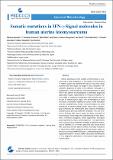| dc.contributor.author | Tonegawa, Susumu | |
| dc.date.accessioned | 2020-04-30T14:09:29Z | |
| dc.date.available | 2020-04-30T14:09:29Z | |
| dc.date.issued | 2018-09-28 | |
| dc.identifier.issn | 2637-4927 | |
| dc.identifier.uri | https://hdl.handle.net/1721.1/124936 | |
| dc.description.abstract | Uterus Leiomyosarcoma (uLMS), unfortunately, is a dis-ease with a poor prognosis. In the report of the Ministry of Health, Labor and Welfare, the 50% survival time (mOS) summarized from Stage I to Stage IV was 31months. Pre-operative diagnosis of uLMS is very difficult. Although it is diagnosed as “uterine fibroids”, it is not uncommon in cases where the uterine leiomyosarcoma is definitely diagnosed again after surgical hysterectomy or removal of myoma. Hu-man uLMS is neoplastic malignancy that typically arises in tissues of mesenchymal origin. The identification of novel molecular mechanism leading to human uLMS formation and the establishment of new clinical therapies has been hampered by several critical points. Mice with a homozy-gous deficiency for Proteasome beta subunit (Psmb)9/β1i spontaneously develop uLMS-like neoplasm. The use of re-search findings with mouse model has been successful in increasing our knowledge and understanding of how alterations, in relevant oncogenic, tumor suppressive, and signal pathways directly impact sarcomagenesis. The experiments with human clinical materials revealed a defective expres-sion of PSMB9/? 1i in human uLMS that was traced to the IFN-γ pathway and the specific effect of somatic mutations of Janus kinase (JAK) 1molecule and/or promoter region on the locus cording PSMB9/β1i gene. Understanding the bio-logical characters of human uLMS may lead to identification of new diagnostic candidates or therapeutic targets against human uLMS. | en_US |
| dc.language.iso | en | |
| dc.publisher | MedDocs Publishers LLC | en_US |
| dc.relation.isversionof | 10.33582/2637-4927/1014 | en_US |
| dc.rights | Creative Commons Attribution 4.0 International license | en_US |
| dc.rights.uri | https://creativecommons.org/licenses/by/4.0/ | en_US |
| dc.source | MedDocs Publishers | en_US |
| dc.title | Somatic mutations in IFN-γ-Signal molecules in human uterine leiomyosarcoma | en_US |
| dc.type | Article | en_US |
| dc.identifier.citation | Hayashi, Takuma et al. “Somatic mutations in IFN-γ-Signal molecules in human uterine leiomyosarcoma.” Annals of biotechnology 1 (2018): 1014 © 2018 The Author(s) | en_US |
| dc.contributor.department | Picower Institute for Learning and Memory | en_US |
| dc.relation.journal | Annals of biotechnology | en_US |
| dc.eprint.version | Final published version | en_US |
| dc.type.uri | http://purl.org/eprint/type/JournalArticle | en_US |
| eprint.status | http://purl.org/eprint/status/PeerReviewed | en_US |
| dc.date.updated | 2020-01-30T18:26:06Z | |
| dspace.date.submission | 2020-01-30T18:26:08Z | |
| mit.journal.volume | 1 | en_US |
| mit.journal.issue | 3 | en_US |
| mit.license | PUBLISHER_CC | |
| mit.metadata.status | Complete | |
